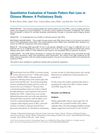 29 citations,
May 2010 in “Annals of Pharmacotherapy”
29 citations,
May 2010 in “Annals of Pharmacotherapy” Finasteride may help some women with hair loss, but better options exist.
 15 citations,
January 2019 in “International Journal of Women's Dermatology”
15 citations,
January 2019 in “International Journal of Women's Dermatology” Early treatment helps stop hair loss in women of color.
 10 citations,
January 2009 in “Elsevier eBooks”
10 citations,
January 2009 in “Elsevier eBooks” Hair growth is influenced by hormones and goes through different phases; androgens can both promote and inhibit hair growth depending on the body area.
 2 citations,
January 2017 in “Skin appendage disorders”
2 citations,
January 2017 in “Skin appendage disorders” Women with and without hair loss have similar amounts of exogen hairs, so these hairs are not a key factor in hair loss conditions.
 64 citations,
June 2010 in “Journal of The European Academy of Dermatology and Venereology”
64 citations,
June 2010 in “Journal of The European Academy of Dermatology and Venereology” Finasteride improves hair density and thickness in women with hair loss.
 38 citations,
January 2015 in “Journal of Cosmetic Dermatology”
38 citations,
January 2015 in “Journal of Cosmetic Dermatology” The nutritional supplement improved hair density and reduced hair loss in women with female pattern hair loss.
 22 citations,
May 2013 in “Experimental and Therapeutic Medicine”
22 citations,
May 2013 in “Experimental and Therapeutic Medicine” Minoxidil improves quality of life for women with hair loss.
 19 citations,
May 2013 in “Annals of Oncology”
19 citations,
May 2013 in “Annals of Oncology” Aromatase inhibitors cause male pattern hair loss in women.
 4 citations,
May 2021 in “Dermatologic Clinics”
4 citations,
May 2021 in “Dermatologic Clinics” The conclusion is that hair loss in women is caused by a mix of hormonal, environmental, and genetic factors, and treatments should target these various causes.
 20 citations,
April 2016 in “Journal of Cosmetic Dermatology”
20 citations,
April 2016 in “Journal of Cosmetic Dermatology” Methyl vanillate spray increases hair count and hair mass in women with hair loss.
 September 2015 in “Dermatologic Surgery”
September 2015 in “Dermatologic Surgery” Computer-aided imaging system accurately measures baldness in Chinese women with hair loss.
 416 citations,
September 1997 in “Journal of Investigative Dermatology”
416 citations,
September 1997 in “Journal of Investigative Dermatology” People with hair loss have more androgen receptors and enzymes in certain follicles, with men and women showing different patterns.
 20 citations,
October 2006 in “Skin Research and Technology”
20 citations,
October 2006 in “Skin Research and Technology” Women with AGA have less hair on midscalp, more thin and non-growing hair.
 14 citations,
September 2020 in “Clinical, cosmetic and investigational dermatology”
14 citations,
September 2020 in “Clinical, cosmetic and investigational dermatology” The hair serum significantly improved hair growth and reduced hair fall without causing any skin issues.
 January 2024 in “Forte Journal”
January 2024 in “Forte Journal” The hair oil with lemongrass and coconut oil promotes hair growth effectively.
 759 citations,
February 2009 in “Current Biology”
759 citations,
February 2009 in “Current Biology” Hair follicles are complex, dynamic mini-organs that help us understand cell growth, death, migration, and differentiation, as well as tissue regeneration and tumor biology.
 25 citations,
July 2017 in “Archives of Dermatological Research”
25 citations,
July 2017 in “Archives of Dermatological Research” Herbal products might promote hair growth with fewer side effects, but more research is needed to confirm their safety and effectiveness.
 16 citations,
June 2008 in “Springer eBooks”
16 citations,
June 2008 in “Springer eBooks” Over 50% of women over 50 experience hair loss, with minoxidil being the only proven effective treatment.
 11 citations,
January 2001 in “Cambridge University Press eBooks”
11 citations,
January 2001 in “Cambridge University Press eBooks” Androgens can cause hair growth in some areas but hair loss on the scalp.
 7 citations,
August 2021 in “Heliyon”
7 citations,
August 2021 in “Heliyon” Phyllotex™ extract was found to significantly promote hair growth and protect against hair loss.
 1 citations,
November 2011 in “Dermatologica Sinica”
1 citations,
November 2011 in “Dermatologica Sinica” Women using hair relaxers with alopecia had lower zinc levels, suggesting zinc deficiency might contribute to hair loss.
 July 2024 in “Journal of Dermatology Research Reviews & Reports”
July 2024 in “Journal of Dermatology Research Reviews & Reports” Stem cell therapy shows promise for treating hair loss by promoting hair growth.
 July 2023 in “Research journal of pharmacy and technology”
July 2023 in “Research journal of pharmacy and technology” The hair tonic with Capsicum frutescens extract helps hair grow in male rabbits.
 1113 citations,
August 1999 in “The New England Journal of Medicine”
1113 citations,
August 1999 in “The New England Journal of Medicine” Hair follicle biology advancements may lead to better hair growth disorder treatments.
 71 citations,
January 2016 in “International Journal of Trichology”
71 citations,
January 2016 in “International Journal of Trichology” Biotin deficiency is not a major cause of hair loss in women, so biotin supplements are not likely to be an effective hair loss treatment.
 54 citations,
February 2010 in “British Journal of Dermatology”
54 citations,
February 2010 in “British Journal of Dermatology” Hair loss in women may have causes other than hormones.
 1 citations,
July 2016 in “Prescriber”
1 citations,
July 2016 in “Prescriber” Minoxidil and spironolactone slow hair loss in women.
 January 2017 in “Springer eBooks”
January 2017 in “Springer eBooks” Over 40% of postmenopausal women experience hair loss, with treatments aiming to stop further loss and possibly thicken hair.
 10 citations,
December 2010 in “British Journal of Dermatology”
10 citations,
December 2010 in “British Journal of Dermatology” After menopause, some women lose scalp hair and gain facial hair, with patterns suggesting different underlying causes.
 5 citations,
March 2001 in “Clinics in Dermatology”
5 citations,
March 2001 in “Clinics in Dermatology” Diagnose and manage hair issues in women by checking medical conditions and using personalized treatments.






























